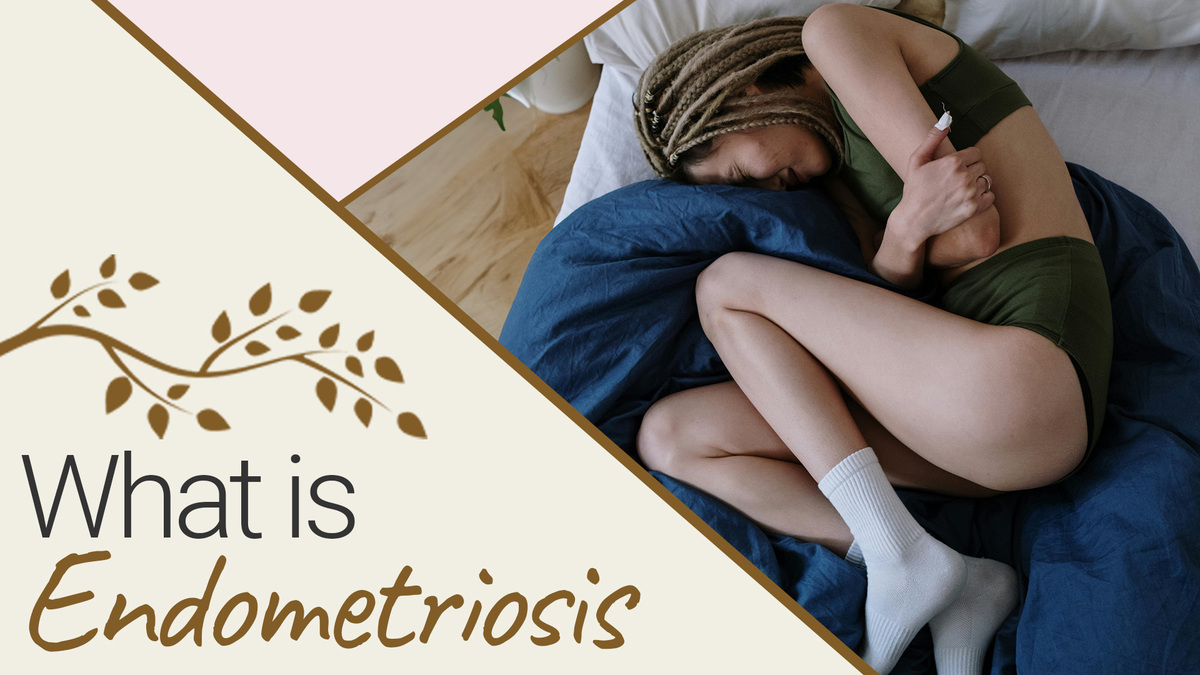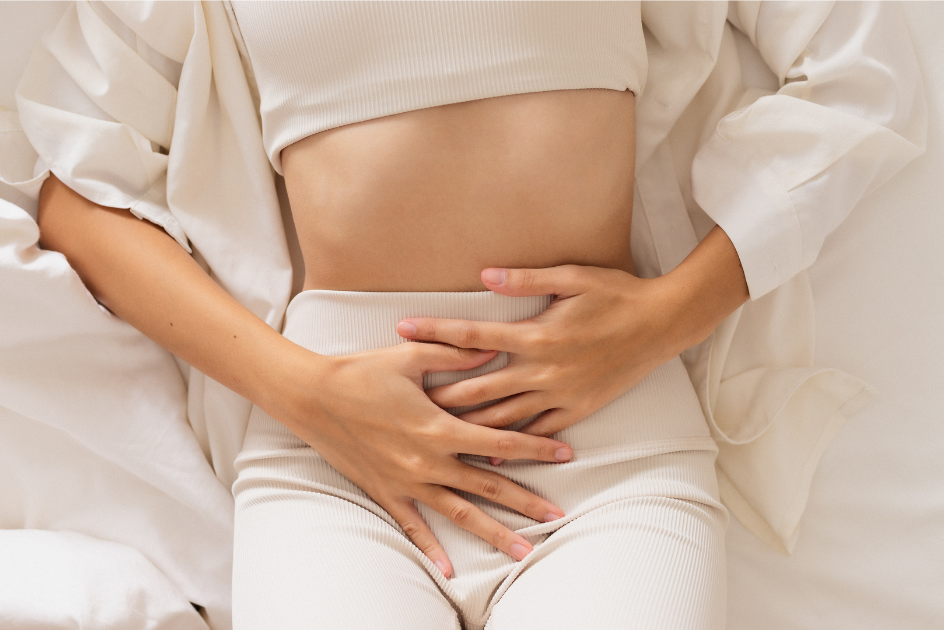What is Endometriosis?

Endometriosis is a very painful condition that occurs when tissue, like that found in the inner lining of the uterus, grows outside of the uterus. This condition is known to affect the ovaries, fallopian tubes, and the tissue around the pelvis. Not only does it cause immense pain, but endometriosis can also cause fertility issues.
The endometriosis tissue behaves like tissue inside of the uterus as well, meaning that it thickens, breaks down, and bleeds with each menstrual cycle. However, since this tissue is not inside the uterus, the body cannot expel it after it breaks down. If endometriosis affects the ovaries, painful cysts can form as well, called endometriomas. This condition can also cause pelvic tissues and organs to stick to one another within the pelvic cavity.
As a result, women suffering from endometriosis will notice intense, severe pain, especially during their menstrual period, when the tissue is bleeding. Fortunately, with medical intervention, women can take control of their endometriosis symptoms. While there is no cure for endometriosis, there are things women can do to reduce its severity and even become pregnant.
In this post, we will discuss the specifics of endometriosis and fertility. We will talk about how you can know if you have endometriosis, some symptoms of endometriosis, and how you can pursue treatment to lessen the severity of this painful condition. Keep reading to discover more!
new.png)
How Do I Know If I Have Endometriosis?
Endometriosis, classified as a gynecological condition, affects millions of women worldwide. It is estimated that as many as 1 in 10 women of reproductive age are affected by this chronic disorder. Many women may be unaware that they have endometriosis, as its symptoms can be varied and often overlap with other medical conditions. That is to say, while some women experience severe pain every month, others may not notice symptoms at all.
If you suspect you have endometriosis, it is important to consult with a healthcare professional who specializes in women's health. They will be able to perform a thorough examination and diagnostic tests to confirm or rule out the presence of endometriosis.
If you experience persisting symptoms such as chronic pelvic pain, painful periods, heavy periods, or fertility issues, then you may have endometriosis. With early diagnosis and proper management, women can effectively manage the symptoms of endometriosis and improve their quality of life.
We touched on them briefly above, but in the next section, we will take a deeper dive into the symptoms of endometriosis.
What are the Symptoms of Endometriosis?
Endometriosis can have a variety of common symptoms as it can cause endometrial tissue to grow in a variety of places in the reproductive area. Most commonly, women report severe pain during menstrual periods, pain during sex, pain from regular bodily functions like defecation, or regularly feeling sick. Below we will take a closer look at these symptoms.
- Uterine or abdominal pain. Women with endometriosis often experience chronic pelvic pain, which is commonly described as a dull, aching sensation in the lower abdomen. The pain may vary in intensity throughout the menstrual cycle.
- Period pain that prevents normal activity. Many women with endometriosis experience severe menstrual cramps that are much worse than normal period pain. These painful cramps can be debilitating and may interfere with daily activities.
- Pain during or after sex. Endometriosis can cause pain during or after sexual intercourse, known as dyspareunia.
- Pain when urinating or defecating. Some women with endometriosis may experience pain or discomfort when urinating or having a bowel movement. This can be attributed to the abnormal growth of endometrial tissue near the bladder or intestines.
- Feeling sick, constipation, diarrhea, or blood in your urine or stool during your period. Endometriosis can also cause gastrointestinal symptoms such as nausea, bloating, constipation, diarrhea, or even rectal bleeding during menstruation. These symptoms can be distressing and affect the overall quality of life.
It is important to note that the severity and combination of symptoms can vary among individuals. Always consult a healthcare professional if you experience any of these symptoms, especially if they interfere with daily activities, have an impact on fertility treatments, or if you suspect you may have endometriosis.

How to Pursue Treatment for Endometriosis
Remember, while there is no cure for endometriosis, there are steps you can take to lessen the effect it has on your daily life.
The first step is to schedule an appointment with a reproductive health specialist, like Dr. Chin or an OBGYN, who has experience in treating this condition. During the appointment, it is important to discuss your symptoms and concerns openly with the healthcare provider. They may conduct a pelvic exam and possibly recommend imaging tests to confirm the diagnosis. By doing this they can tell where the endometrial cells are growing, whether you have ovarian cysts, and whether scar tissues are present.
Once the diagnosis is confirmed, it is crucial to explore various treatment options. These may include medications to manage symptoms and provide pain relief, hormone therapies, or surgical intervention. It is important to educate yourself about the risks and benefits of each treatment option and collaborate with your healthcare provider to develop a personalized treatment plan tailored to your needs and preferences.
When considering treatment options, it is important to consider the severity of your endometriosis and the desire for future pregnancy, as this can impact treatment choice. Your healthcare provider will be able to guide you in making informed decisions.
If you are trying to get pregnant and severe endometriosis is standing in the way, in vitro fertilization (IVF) may be a pathway to pregnancy for you.
Diagnosing and Treating Endometriosis with the Fertility Wellness Institute of Ohio
Endometriosis is a serious and often painful condition that affects women's mensural health and can create obstacles in the path of having a baby. Fortunately, with modern fertility treatments, the symptoms of endometriosis can be controlled, and pregnancy can be achieved through treatments like IVF.
IVF can circumnavigate many of the issues that endometriosis causes when women are trying to get pregnant. Issues like blockages and scar tissue that often accompany endometriosis can be negated, because the fertilized egg is planted inside the woman's uterus.
If you are interested in pursuing pregnancy and managing the symptoms of endometriosis, Dr. Chin and the team at the Fertility Wellness Institute of Ohio are here for you with expert guidance and industry-leading experience.
Click here to schedule an appointment with Dr. Chin now!
Follow the Fertility Wellness Institute of Ohio on Facebook, Instagram, X, and LinkedIn!

